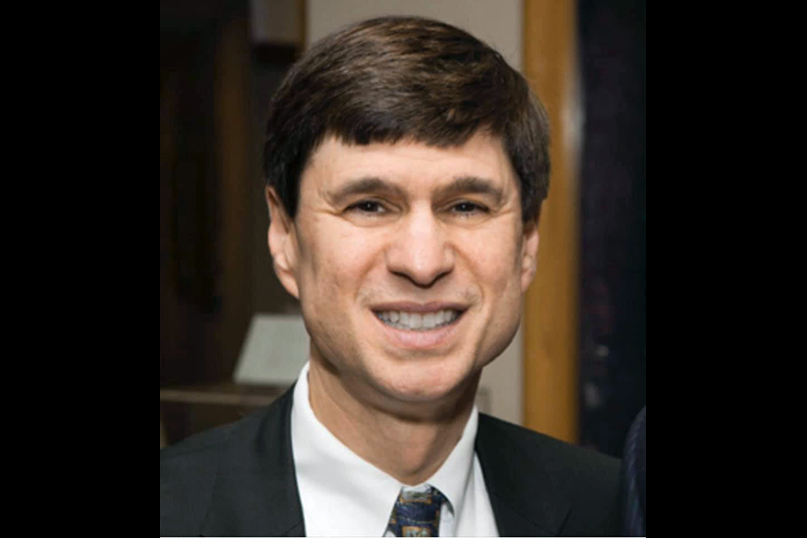
By Stacey Dresner
SOUTHBURY – When the board of the Jewish Federation of Western Connecticut was searching for a new chief executive officer, Eric Albert immediately thought of Gary Jones.
“As a member of the search committee, I first reached out to Gary to see if he would be interested in speaking with the committee about this position,” said Albert, a past Federation president. “I have known Gary for many years and I consider him to be an extremely thoughtful and creative Jewish professional with extensive knowledge of the challenges and opportunities facing the Jewish community. Just as important, he is a mensch who has a great way with people.”
The search committee and board agreed and Jones became CEO of the Southbury-based organization in November.
Jones, a longtime resident of West Hartford, does indeed have extensive knowledge of the state’s Jewish community.
While practicing law in Waterbury and Hartford for many years, he was also a lay leader at several Jewish organizations, including the Jewish Federation of Greater Hartford and its Jewish Community Relations Committee, the Anti-Defamation League (ADL), and Hebrew Senior Care, formerly the Hebrew Home and Hospital. Today, he is the president of the Jewish Federation Association of Connecticut, which provides advocacy and other services to all seven of the state’s Jewish Federations and their agencies.
In 2010, Jones left his work as an attorney to become executive director of the ADL’s Connecticut office. He also did a stint as interim director of UConn Hillel in 2015, and later helped Hebrew Senior Care through its bankruptcy as its interim executive director. Last spring, as Covid-19 began its spread, he was asked again to served as interim director of UConn Hillel.
It is Jones’ experience as a trouble-shooting Jewish non-profit leader that made him perfect candidate for his new role.
“We are fortunate to have found an individual with such a diverse array of skills and experiences to lead our Federation,” says Pauline Zimmerman, president of the Federation. “We consider it a bonus that his positions as an attorney in Waterbury and as the Regional Director of the Connecticut Regional Office of the Anti-Defamation League have given Gary a very good understanding of our communities and resulted in excellent relationships with many of the leaders of Federation and other Jewish communal organizations here in Western Connecticut.”
“I am honored to have been asked to take on this position,” says Jones. “I am so deeply impressed with the quality and commitment of the Federation’s Board members and look forward to working with the Board and all of the Federation’s supporters and constituents to help ensure that we honor our Jewish values in all that we do.”
Jones gained those Jewish values from his parents, Herbert, a native of Boston, Massachusetts, and Vivienne, from Portland, Maine. After relocating to Manchester, New Hampshire for a time, the family returned to Leominster where they were members of Congregation Agudat Achim, where his mother served as principal of the synagogue’s Hebrew school and his father as the shul’s president Jones said he planned to be an attorney early on.
Jones got his BA in politics and American studies at Brandeis University, graduating magna cum laude. He then went to New York University Law School.
After law school, he moved to Connecticut to be in the vicinity of both his friends in New York and family in the Boston area.
He joined the Hartford law firm Schatz & Schatz, Ribicoff & Kotkin in 1980, becoming a partner in 1988. He was a corporate lawyer doing mostly work in corporate and commercial finance. In 1996, the firm closed due to a Hartford’s weak economy, and Jones joined Drubner, Hartley, O’Connor and Mengacci in Waterbury as a partner. He later served as a partner of the now defunct law firm Levy & Droney in Farmington for several years.
Five years after arriving in Hartford, Jones married Jill Epstein, a New Haven native whose parents were among the founders of Congregation B’nai Jacob in Woodbridge.
He got involved as a lay leader in Hartford’s Jewish community, serving on various committees and task forces at the ADL, the Jewish Federation of Greater Hartford, and the Hebrew Home.
“Jewish identity has always been important for my family,” Jones explains. “I received a lot of great direction from my family and extended family about Jewish causes and Jewish values, so there was no big leap of faith for me to do it. Maybe I got involved in a little bit more comprehensive way than maybe some of the others, but this is something that is important to all of us.”
It was Jones’ extensive involvement in the Jewish community that led to his departure from a full-time law practice in 2010. He had been serving as chair of the ADL’s Hartford County Committee for five years when he got a call one day from David Warren, the director of the Connecticut office of the ADL.
“He was calling to give me the news that he was taking a position in the national office of ADL,” Jones recalls. “I was very excited for him and I said, ‘The only thing I feel bad about is that we’ve been doing pretty well in Connecticut under your leadership.’ He said, ‘Well, that was the next reason I called.’ He asked me to consider applying for the position. It took me a little while to think about it, being a lawyer. But I felt like the opportunity to be involved in an organization that I really cared about, and able to really do good things for the Jewish communities, was something that really meant a lot to me.”
Jones said that even though it meant leaving the prestigious – and lucrative – law field, the idea of heading a non-profit organization appealed to him.
“I felt that I really needed to try this. I tried it and I liked it,” Jones says. “And the ADL worked with political issues and Jewish issues which were both meaningful to me.”
When the Hebrew Home and Hospital was without a director and headed for bankruptcy, Jones was called on to serve and offer his non-profit expertise.
“They needed someone who knew the community and nonprofit management and who was able to sort of help through the bankruptcy and get to the point where a more seasoned healthcare professional would come in at a very difficult time,” Jones says.
He played a similar role at UConn Hillel this past summer – mostly virtually, due to Covid-19.
“They lost their development director or an executive director and I think they just needed to have leadership to support them and help them do the great work that they do.”
When contacted by Eric Albert about the CEO position in Western Connecticut, Jones said he knew it would be a good fit.
“I worked in Waterbury as a lawyer for several years, so I know a lot of the people from the community. And, of course, when I was the ADL director I spent time in Western Connecticut as I did in many parts of the state,” he says. “They’re great people and I am excited to be there.”
Since Jones began the new position in mid-November, Covid has forced him to work virtually from home as he tries to get up to speed on the Federation and its needs.
“I think one of the challenges is that for any smaller Federation, the need and the desire to be as comprehensive as possible is still there, but obviously the resources aren’t always available to be able to do everything you would like to do,” he explains. “One of the things we would like to be able to build on is one of the thing things that has happened during the pandemic, which is a lot more outreach, a lot more joint programming and a lot more efforts whereby one Federation makes available its programming or educational opportunities to other Federations. That’s been really good and it is one of the things that I think we’re going to be building on statewide.”
Jones added that his work as president of JFACT will aid in his new position, although he will soon step down from that role.
“I know all the Federation directors very well, some for many years, and I feel really good about the ability for us to continue to work together. That will enable us to do programming and provide opportunities jointly that we may not be in a position to provide on our own as a standalone smaller organization.
“The Federation was operating without an executive director since just before the pandemic broke,” he notes. “We will get up to speed. There are three staff people and ultimately we will see if we do can everything the community needs us to do, or whether we need to expand… That would be one of the goals, but right now the main thing is using what we have to give the community the educational and programmatic opportunities that it deserves. I’m optimistic we can do that.”







 Southern New England Jewish Ledger
Southern New England Jewish Ledger













